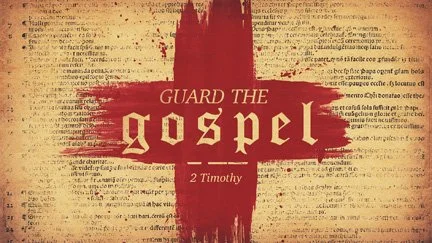Exodus 20:1-3
I’d like to try a little exercise with you this morning. I want you to take a small piece of paper and a pen or pencil. And I want you to number 1, 2, and 3. Now, I want you to list the 3 things that matter most to you. Don’t think about it too long, just put down the first 3 things that come to your mind. What are the 3 most important things in your life?
In his book, The Ten Commandments from the Backside, author J. Ellsworth Kalas suggests that “When we draw up our little list of things that matter most, that which we designate Number One is god. Whether or not it is God with a capital G is another matter.”
As we begin our sermon series on the Ten Commandments, we begin with God. What we think about God determines what we think about ourselves and about others. This first commandment is the big one, the most important one, because all the others depend on whether or not we keep this one. As author Anne Robertson puts it in her book, God’s Top 10, “I think this one heads the list because, like the top button on a shirt, if you don’t get this one right, all the rest will be messed up as well.”
But let’s back up for just a minute and set the stage. For one thing, you might be wondering, “Why is she preaching a sermon series on the Ten Commandments? What do they have to do with anything?” Well, I am preaching on the Ten Commandments for a couple of reasons. First, when I asked you last fall what you would like to hear sermons about, someone suggested the Ten Commandments. But more importantly, I am preaching on the Ten Commandments because I do think they are relevant to us today. They are not just a bunch of random “thou shalt nots” meant to steal our happiness; they are guidelines meant to help us live healthy and happy lives. At the time of Jesus, the Ten Commandments were recited every day at the Temple and every Jewish child would have memorized them. Jesus knew and practiced them himself. And Paul referred to them in his letters. So they were crucial parts of the formation of Christian faith and practice.
And let’s also remember the setting of the giving of the Ten Commandments. Moses had led the people out of slavery in Egypt to Mount Sinai, the mountain where he had encountered God in the burning bush. Until that day, with the people gathered at the foot of the mountain, and Moses meeting God at the top, the people had never heard the voice of God for themselves. They had only taken Moses’s word for it that God had spoken to him. But now God began by introducing himself to the people.
God spoke and said, “I am the Lord your God, who brought you out of the land of Egypt, out of the house of slavery.” There are several things I think are important about this statement.
First, God gave them his name. “I am the Lord.” In the original text, it would have read, “I am Yahweh,” or “I Am Who I Am.” This was the most personal and sacred name for God in the Hebrew Bible. When God called Moses from the burning bush to go to Egypt and bring his people out of slavery, and Moses asked God whom he should tell the people had sent him, this was the name God had given him. “I Am.” This name is found over 6,400 times in the Old Testament. But it is so sacred that Jews today will not pronounce it, and so it has been replaced with the word “Lord.” By giving this name to the people, God was letting them know that he was the same God who had sent Moses to lead them to freedom.
Second, God said “I am YOUR God.” Adam Hamilton points out in his book, Words of Life, that the word “your” is in the singular tense; in other words, God is not just the God of the Israelites, but he is the God of each one of the Israelites. God is Moses’s God, and Aaron’s God, and Joshua’s God, and Miriam’s God, and so on. God called each one of these people, and all of these people, his own. He offered them his care and protection.
And third, God was saying to them, “I am your GOD.” As Adam Hamilton states, the Egyptians had worshiped many gods, forces who created and maintained the world and were involved in the affairs of people. But now God was instructing Israel in the truth that all those forces resided in one God who was the source and the sustainer of all that exists.
Then we come to the heart of the first commandment: You shall have no other gods before me. This is calling the Israelites to an exclusive relationship with God. They had worshiped many gods in Egypt, just like the Egyptians did. And during much of the history of the Hebrew Bible, we find that they were tempted into worshiping other gods, especially Baal. The prophets wrote about how painful that was for God. Not only was his heart broken because they were unfaithful to him, but he knew that their worship of false gods would only bring them pain in the end.
We might wonder what this commandment has to do with us. After all, we are not tempted to worship ancient Egyptian gods or the Canaanite god Baal. But that doesn’t mean there are not false gods that tempt us. Because anything can become a god to us. Anything that takes the place of God in our lives is another god. That might be physical fitness, or social media, or a relationship, or clothing, or success, or popularity, or health, or our body, or a hobby, or travel, or a car, or our career, or our retirement account, or our home, or our business. John Killinger writes in his book, To My People with Love, “No other gods – that’s his condition … We must give up our hope in everything else and rest it all in him, letting God be God in everything, in every way. There must be no holdouts, no reservations, no hidden agendas. We must simply let him be God … We must put him in charge of everything. We must fall down and worship him, with no other gods.”
Anne Robertson reminds us of the story of the rich young ruler in the Gospels. He came to Jesus and asked what he must do to inherit eternal life. Jesus asked him what it said in the commandments. The young man quoted some of them and said that he had kept them all his life. Jesus then said he only lacked one thing. He needed to go and sell all he had and give to the poor, and then come and follow Jesus. The young man couldn’t do it. He walked away sad, because he had many possessions. He put his wealth ahead of God. So, in truth, he had not kept all the commandments; he could not even keep the first one. Robertson adds, “I know in my own life I’ve lost it the minute Jesus shows up and says, ‘Hand over your computer!’ Never mind family or friends or job or reputation; I’m knocked out of the running by my hard drive.”
The way to put a more positive spin on keeping the first commandment might be to consider what Jesus said when someone asked him what the most important commandment was. He didn’t quote one of the Ten. Instead, he said, “You shall love the Lord your God with all your heart, with all your soul, with all your mind, and with all your strength.” (Mark 12:30) Really, that is the key to keeping the first commandment. As Adam Hamilton says, “When we love God with all that is within us, we leave no room for false gods.”

























